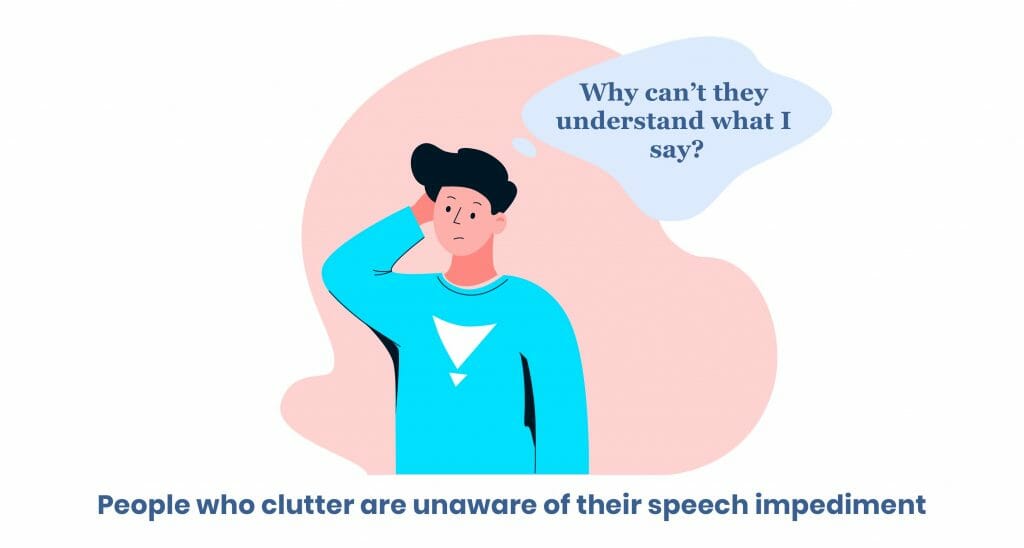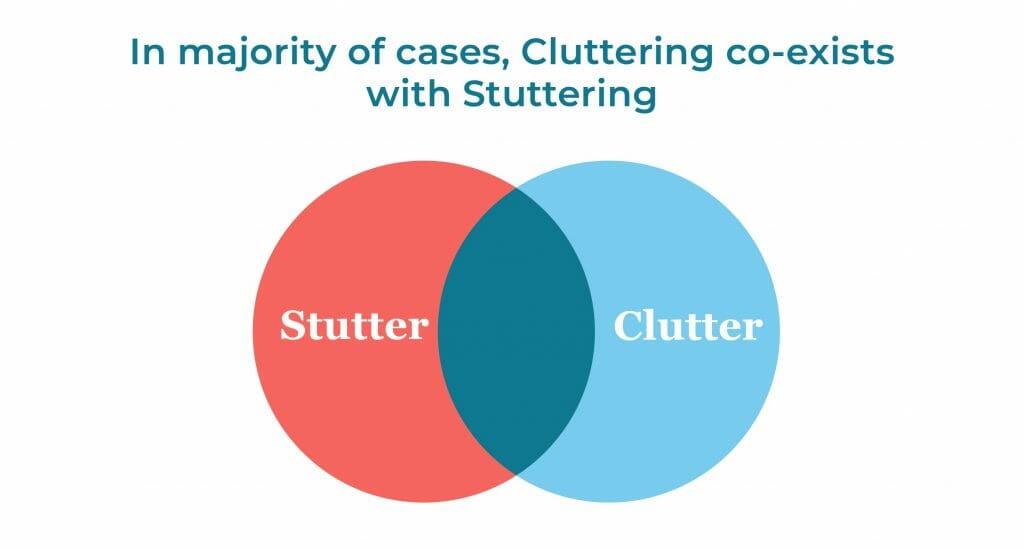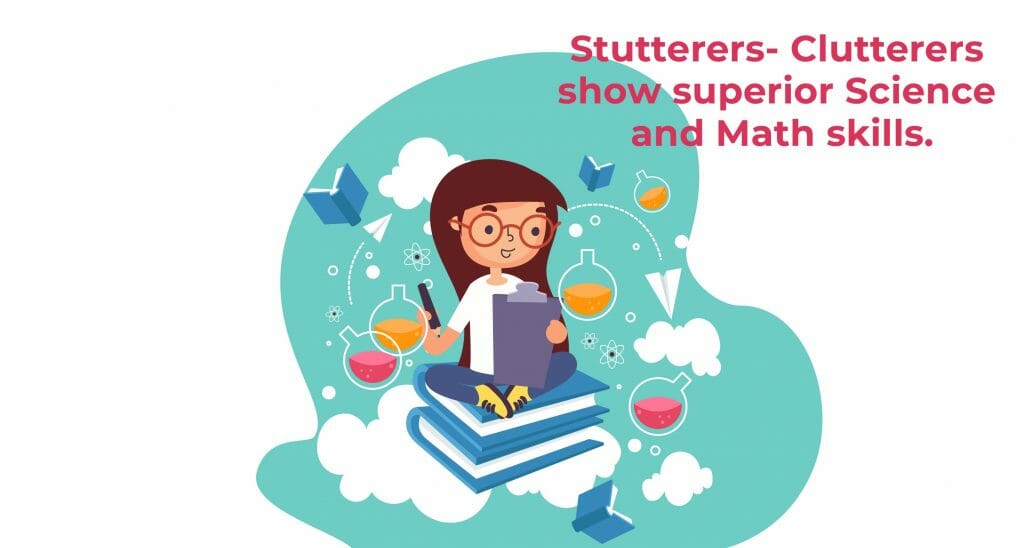There have been early instances where almost every speech disorder was categorized as stuttering. While stuttering is a disruption of normal fluency of speech, cluttering is a little different from that. Here in this post, we will discuss ‘cluttering vs. stuttering’ in detail.
First things first, let’s understand the basics.
What is Stuttering?
Stuttering has a few core characteristics including blocks, repetitions, and prolongation of sounds, syllables, or entire words. On the other hand, cluttering is a relatively lesser-known speech disorder quite distinct from stuttering. The disruptions in the case of stuttering are not under the control of the speaker.
A person who stutters may use secondary behavior to avoid or reduce the frequency of their stuttering. In most cases, stuttering causes and is worsened by negative emotions like embarrassment, fear, and anxiety. Those who stutter often harbor a negative attitude that beats down their self-esteem.
What is Cluttering?
Individuals who clutter can produce incomplete phrases, fillers, phrase repetitions, hesitations, and revisions. However, these are all without any physical distress or tension.
Interestingly, in the case of cluttering, the speaker does not always speak rapidly. The speech comes in sudden bursts of undulated speech which can have disfluencies and misarticulation. Most of the people who clutter are unaware of their speech disfluencies. However, if they become aware, they can successfully make efforts to control their speech disfluency. Their speech can become slower and more understandable with practice and patience.

Strong emotions can precipitate cluttering. When excited, afraid, anxious, or angry, cluttering can become much worse and more frequent. The first researcher to recognize it as a speech disorder distinct from stuttering was Weiss in 1964. He described it as a ‘central language imbalance,’ which may stem from a lack of an organized formulation process.
But, what is mazing in speech?
A person who clutters often has trouble translating his thoughts into coherent sentences. Similar language behavior is also referred to as "mazing" by some speech-language pathologists.
Do keep in mind that cluttering often exists with other issues, such as hyperactivity, distractibility, articulation disorders, learning difficulties, and auditory processing problems.
Symptoms of Stuttering
The core symptoms that characterize stuttering include –
- Repetition of syllables, words, or entire phrases.
- Prolongation or stretching out word sounds.
- Blocking or stopping while saying a particularly difficult word.
You can read other Stamurai blogs for more authentic information on the symptoms, causes, and treatment options (adults | children) for stuttering.
Symptoms of Cluttering
Let us first look at the core symptoms of cluttering.
Core symptoms of cluttering
Any two of the core symptoms listed below need to be present for cluttering diagnosis. Typically, adults utter around 2.5 to 5.3 syllables per second, and adolescents say between 2.5 to 5.5 syllables per second. Children who can speak should be saying between 2.5 to 5.0 syllables per second.
Any adult uttering more than 5.3 syllables per second may be at risk of cluttering. However, since it is not the only indicator, at least two of the following core symptoms should be present for a conclusive diagnosis.
- A high speech rate
- An irregular speech rate
- Collapsing syllables
- Incorrect use of pauses, volume, and syllable stress
- Repetitions
- Word structure errors, such as jumbling up the syllables in a long word or substitutions
- Sentence revisions
Secondary symptoms of cluttering
Just like stuttering, cluttering also has secondary symptoms. These symptoms can vary between two people who clutter. The more common ones include –
- The use of filler words, such as "uhh," "umm," "well," "like," and "mostly."
- Poor articulation or mumbling of words.
- Difficulty in finding the right word or word retrieval.
A person who clutters often has trouble translating their thoughts into coherent sentences. It is also referred to as "mazing" in speech by some experts and speech-language pathologists (SLPs)
Cluttering Vs. Stuttering: Differences
- Someone who clutters will talk better than someone who stutters under stress.
- Interruptions may not disrupt the natural flow of speech of someone who clutters.
- Cluttering does not affect the person's ability to talk in longer sentences. Whereas, stuttering may make it difficult for someone to say longer sentences.
- Someone with cluttering may read unfamiliar texts fluently. Those who stutter may speak better if they rehearse their speech.
- Someone who clutters typically has no awareness of their fluency problems. On the other hand, someone who stutters can experience anxiety, fear, and shame related to speech.
Cluttering Vs. Stuttering: Similarities
- Both cluttering and stuttering are fluency disorders.
- Both cluttering and stuttering have people pausing or stopping when they don’t actually want to.
- People with either cluttering or stuttering may leave words unfinished.
- In either case, individuals may repeat syllables, words, and phrases.
- Individuals with either stuttering or cluttering may stop in the middle of a sentence and rephrase.
With this information, you should be able to understand the differences and similarities between a ‘clutter’ and a ‘stutter.’
Can Stuttering & Cluttering Co-occur?

Sadly, many people who stutter may also have symptoms of cluttering. SLPs may classify individuals as having both stuttering and cluttering if they exhibit the following symptoms –
- Difficulty in finding the right words
- Poor reading abilities
- Poor ability to narrate an incident or poor story-telling
- Below-average memory
According to Daly et. al. (1993), individuals who show symptoms of both stuttering and cluttering may also show superior skills in science and math.

How Common Is Cluttering?
Researchers and SLPs have estimated that about 1 out of 3 children & adults who stutter also clutter. However, you should note that people are more commonly diagnosed with other fluency disorders such as stuttering. Cluttering does not receive as much attention.
There are more clinical anecdotes than data to support the claim that one-third of the children & adults who stutter also clutter. A preliminary study on school-aged children shows the prevalence rate of stuttering is between 1.1% and 1.2% among participants.
How is Cluttering Diagnosed?
Cluttering may be confused with other language disorders and learning disabilities. In the past, cluttering has also been confused with attention deficit hyperactivity disorder (ADHD) among children. It may be because those who clutter also have reading and writing disabilities. Some may also exhibit poor memory and integration of thoughts & ideas.
Diagnosing cluttering is challenging because everyone clutters to some extent, especially when angry, surprised, or excited. So, the SLP should note at least one of the following traits for the diagnosis of cluttering –
The person over-articulates
When they speak, the sounds and syllables overlap or blend together. It may sound like they are not including all the syllable sounds in their speech.
The speaker may use too many interjections
The person uses normal disfluencies and revisions while talking. They may say, "I want to…uh…get sushi" or "I would like to…I want to go out for dinner."
They may pause unexpectedly
A person who clutters may pause in places that are unexpected grammatically. It can make their speech sound jerky or staggered.
Other characteristics that the speech therapist notes before making a conclusive cluttering diagnosis are –
- Almost no physical struggle while speaking.
- Temporary improvement of speech when someone asks them to "pay attention" or "talk slowly"
- Disorganized language and conversational skills.
- Limited to no awareness of their fluency problems.
- More than one blood relative, who clutters.
Only a trained Speech-Language Pathologist (SLP) should make the diagnosis. A thorough assessment considers other fluency disorders that might better explain the condition.
If additional symptoms of other disorders are present, they require assessment and evaluation from other professionals including special educators, psychologists, and behavioral therapists.
Examples of Cluttering
Let's consider the phrase "do you know where my book is?" It is a straightforward question consisting of fairly uncomplicated words. Someone who clutters maybe say it in the following manners –
“Do you...uh…you know where my book is?”
“Do you…have you seen my book?”
“Do…you know where…my book is?”
“Do you know where by mook is?”
Cluttered speech can be challenging to understand for the listeners. However, telling the speaker to slow down at every instant can be incredibly frustrating for the person.
Can Speech Therapists Help With Cluttering?
Do you want to stop cluttering? Well, qualified speech therapists can help reduce your cluttering. Irrespective of age, one can observe an improvement in speech after practicing exercises for cluttering.
You can reduce most cluttering symptoms through simple adjustments in speech, such as the rate.
Therapy takes practice and patience. However, speech therapists can come up with a custom speech therapy plan to alleviate cluttering symptoms.
The SLP or speech therapist can teach you how to –
- Slow your speech down using speech therapy exercises and techniques
- How to improve your speech fluency
- Creating short-term and long-term goals for the individual
- Improving your self-awareness about your speech
- Developing and enhancing your self-monitoring skills
You can choose to attend speech therapy in person or via online personal video chat. Remember to take feedback from your speech therapist or SLP about your progress after each session.










